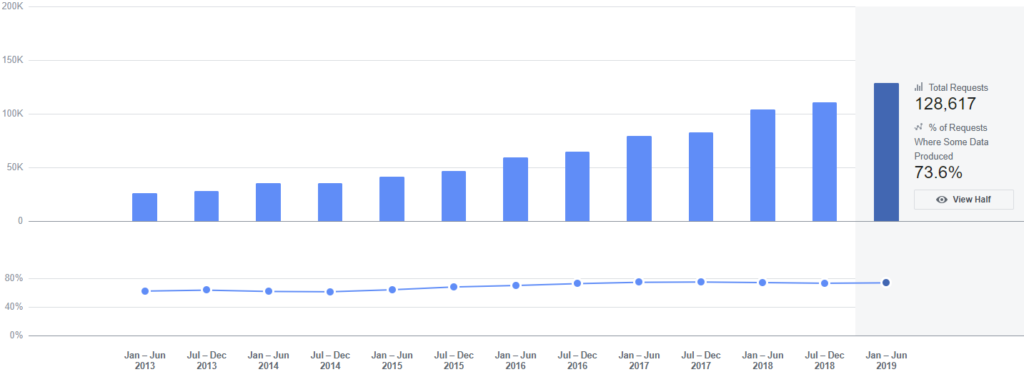
Number of Government Requests for User Data to Facebook is on the Rise
- Facebook has received the highest number of user data requests ever in the previous semester.
- Most of the requests concerned legal prosecution cases and were adequately supported by warrants.
- The platform will share very sensitive and exposing user data with the authorities, and may even do so proactively.
According to Facebook’s most recent transparency report, government requests to hand over user data have reached record-breaking figures once again. More specifically, between January and June 2019, Facebook received 128617 requests of this type, 16.25% up from the previous semester, and 23.9% up compared to the same period last year. This trend to see a rise in the number of data requests has been steady since 2013 when Facebook started reporting on this with the government requests being around 25 thousand back then. For the requests that concern the latest period, Facebook responded to 73.6% of them providing at least some of the requested data.
Source: Facebook
The majority of the requests (90.5%) concern data that are required in the context of legal procedures, helping courts reach safe conclusions, plaintiffs state their case, and defendants strengthen their position. For these requests, governments have to produce a search warrant otherwise they are rejected. In the remaining 9.5% of the cases, Facebook received emergency requests that had to do with investigations where human lives were in risk or danger. The social media giant answered to 73.7% of the “legal process” requests, and 70.1% of the “emergency” ones. As Facebook points out, in some cases where they have a reason to believe that someone is in danger, they voluntarily share data with law enforcement and do so proactively.
Source: Facebook
As for the countries that championed the list, the United States is at the top with 50741 requests (88% answered), while India came second with 22684 requests (54% answered). Further below, the United Kingdom submitted 7721 requests (90% answered), Germany submitted 7302 requests (58% answered), and France submitted 5782 requests (70% answered). Interestingly, the Chinese government submitted no requests, and Russia submitted only 8, none of which was approved by Facebook.
It is also important to clarify that the above figures correspond to the requests that Facebook received about all of its products, including the popular social media platform, Messenger, Oculus, Instagram, and Whatsapp. As for what data was shared with the authorities, this includes the name of the user, the registration date, the IP address logs, and account content. Other things that may be requested and shared if approved are the email addresses, credit card information, the content of communications, and other transactional data.
Are you worried about the possibility of Facebook sharing your data with your government? Let us know in the comments down below, or on our socials, on Facebook and Twitter.







